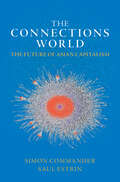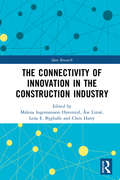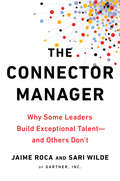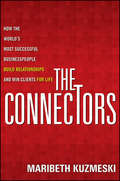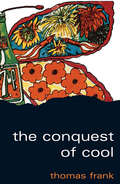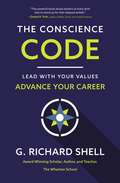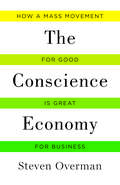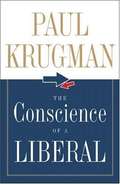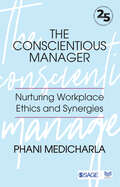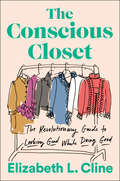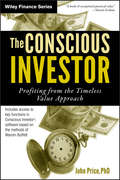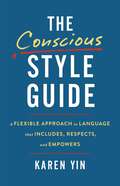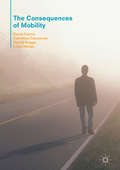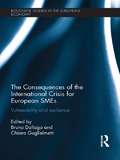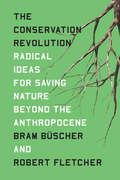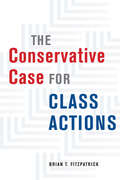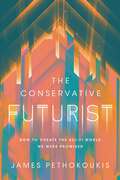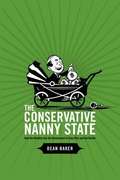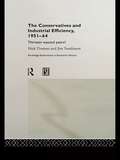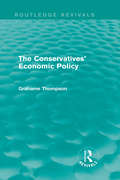- Table View
- List View
The Connection
by Anthony SilardIn this landmark book, leadership guru Anthony Silard takes a holistic view of success that makes sense in a modern world. With the proliferation of texting, emails, smart phones, and more, our home lives have begun to look a lot like work and now, more than ever, people crave deep connections and fulfillment in both their personal and professional lives. The Connection provides ways to handle the unprecedented information flow, increased loneliness, and lack of purpose that so often characterize modern culture. The Connection is a valuable resource for people who wish to live with value and purpose and develop a more centered, directed, and resilient approach to life.With a simple set of exercises, Silard shows you how to bring worth and drive to every aspect of your life by transforming your lofty dreams into concrete, deadline-driven goals that align your deepest values with your everyday existence. Silard will help you understand the true source of your passion and motivation to build a foundation for change, and, ultimately, the skills to cultivate a truly authentic life.The Connection includes dozens of specific tools and strategies, all enhanced with personal examples, inspiring quotes, and insightful anecdotes to offer an entertaining and life-changing read.
The Connection: Link Your Deepest Passion, Purpose, and Actions to Make a Difference in the World
by Anthony SilardIn this landmark book, leadership guru Anthony Silard takes a holistic view of success that makes sense in a modern world. With the proliferation of texting, emails, smart phones, and more, our home lives have begun to look a lot like work and now, more than ever, people crave deep connections and fulfillment in both their personal and professional lives. The Connection provides ways to handle the unprecedented information flow, increased loneliness, and lack of purpose that so often characterize modern culture. The Connection is a valuable resource for people who wish to live with value and purpose and develop a more centered, directed, and resilient approach to life.With a simple set of exercises, Silard shows you how to bring worth and drive to every aspect of your life by transforming your lofty dreams into concrete, deadline-driven goals that align your deepest values with your everyday existence. Silard will help you understand the true source of your passion and motivation to build a foundation for change, and, ultimately, the skills to cultivate a truly authentic life.The Connection includes dozens of specific tools and strategies, all enhanced with personal examples, inspiring quotes, and insightful anecdotes to offer an entertaining and life-changing read.
The Connections World: The Future of Asian Capitalism
by Simon Commander Saul EstrinA central feature of modern Asia that trumps differences in economic and political systems is the web of close relationships running between and within business and politics; the connections world. These networks facilitate highly transactional interactions yielding significant reciprocal benefits. Although the connections world has not as yet seriously impeded Asia's economic renaissance, it comes with significant costs and fallibilities. These include the creation and entrenchment of huge market power and the attenuation of competition. They in turn hold back the growth in productivity and innovation that will be essential for further development. The connections world also breeds massive inequalities that may culminate in political instability. The authors argue that if Asia's claim to the 21st century is not to be derailed, major changes must be made to policy and behaviour so as to cut away the foundations of the connections world and promote more sustainable economic and political systems.
The Connectivity of Innovation in the Construction Industry (Spon Research)
by Malena Ingemansson Havenvid Åse Linné Lena E. Bygballe Chris HartyThe construction industry is currently experiencing accelerating developments concerning societal demands along with project complexity, internationalization and digitalization. In an attempt to grasp the consequences of these demands on productivity and innovation, this edited book addresses how innovation is likely to take place with a more long-term perspective on the construction sector. While existing literature focuses on organizational discontinuity and fragmentation as the main reasons for the apparent lack of innovation in the industry, this book highlights the connectivity of construction actors, resources and activities as fundamental for understanding how innovation takes place.Through 15 empirically grounded chapters, the book shows how innovation is part of construction processes on various levels, including project, firm and industry, and that these innovation processes are characterized by organizational and technological connectivity over time. Written by European business management scholars, the chapters cover empirical cases and examples from both a multi-organizational and a multi-international perspective in terms of covering the viewpoints of different industry actors and the contexts of several different European countries including: Sweden, Norway, the UK, Italy, France, Hungary and Poland. By illustrating how connectivity is part of innovation processes in the creation of single-product innovations, of various innovations within and across projects, as well as a fundamental aspect of the processes in which innovations cross nations, the book provides a new angle on how to understand construction innovation and where the industry might (or needs to) be heading next. This book is essential reading for anyone interested in construction management, project management, engineering management, innovation studies, business and management studies.
The Connector Manager: Why Some Leaders Build Exceptional Talent - and Others Don't
by Jaime Roca Sari WildeThere are four distinct types of managers. One performs much worse than the rest, and one performs far better. Which type are you?Based on a first-of-its-kind, wide-ranging global study of over 9,000 people, analysts at the global research and advisory firm Gartner were able to classify all managers into one of four types: • Teacher managers, who develop employees' skills based on their own expertise and direct their development along a similar track to their own. • Cheerleader managers, who give positive feedback while taking a general hands-off approach to employee development. • Always-on managers, who provide constant, frequent feedback and coaching on all aspects of the employee's performance. • Connector managers, who provide feedback in their area of expertise while connecting employees to others in the team or organization who are better suited to address specific needs.Although the four types of managers are more or less evenly distributed, the Connector manager consistently outperforms the others by a significant margin. Meanwhile, Always-on managers tend to see their employees struggle to grow within the organization. Why is that?Drawing on their groundbreaking data-driven research, as well as in-depth case studies and extensive interviews with managers and employees at companies like IBM, Accenture, and eBay, the authors show what behaviors define a Connector manager, and why they are able to build powerhouse teams. They also show why other types of managers fail to be equally effective, and how they can incorporate behaviors of Connector managers in order to be more effective at building teams.
The Connectors
by Maribeth KuzmeskiLearn the relationship-building secrets that lead to lifelong clients, repeat customers, and endless referralsIn today's commoditized marketplace, no matter what product or service you sell, there's probably someone somewhere able to offer it cheaper, faster, and maybe even better. So how do you differentiate yourself from your competitors? The Connectors shows that the only thing that truly sets you apart is the quality of your relationships with your clients and customers.Everyone knows that relationships are important in business. Yet most people would admit that their relationships could be better--but don't spend time working on the underlying skills. This book explains how to develop better, more profitable connections--as illustrated proven by some of the world's most successful professionals. Even if you're not a "people person," you can dramatically grow your business or your career through a few simple approaches to relationship-building.The Connectors presents a five-step methodology that lead to lifelong clients, repeat customers, and endless referrals. Inside, you'll learn how to:Stop networking and start truly connectingCreate an avalanche of referrals and an army of happy customersBecome a "connector," even if you've never been a "people person"Find your social IQ--and improve itPut relationship-building principles to work dailyFocus on others and reap the rewards yourselfAsk the right questions--and sell without sellingDifferentiate yourself through the impact you have on othersIn The Connectors, Maribeth Kuzmeski, founder of Red Zone Marketing, LLC, and consultant to Fortune 500 firms, shows you how to build profitable, long-lasting business relationships.
The Conquest of Cool: Business Culture, Counterculture, and the Rise of Hip Consumerism
by Thomas FrankWhile the youth counterculture remains the most evocative and best-remembered symbol of the cultural ferment of the 1960s, the revolution that shook American business during those boom years has gone largely unremarked. In this revealing book, Thomas Frank shows how the youthful revolutionaries were joined--and even anticipated --by such unlikely allies as the advertising industry and the men's clothing business.
The Conquest of Cool: Business Culture, Counterculture, and the Rise of Hip Consumerism
by Thomas FrankWhile the youth counterculture remains the most evocative and best-remembered symbol of the cultural ferment of the 1960s, the revolution that shook American business during those boom years has gone largely unremarked. In this fascinating and revealing study, Thomas Frank shows how the youthful revolutionaries were joined—and even anticipated —by such unlikely allies as the advertising industry and the men's clothing business. "[Thomas Frank is] perhaps the most provocative young cultural critic of the moment."—Gerald Marzorati, New York Times Book Review "An indispensable survival guide for any modern consumer."—Publishers Weekly, starred review "Frank makes an ironclad case not only that the advertising industry cunningly turned the countercultural rhetoric of revolution into a rallying cry to buy more stuff, but that the process itself actually predated any actual counterculture to exploit."—Geoff Pevere, Toronto Globe and Mail "The Conquest of Cool helps us understand why, throughout the last third of the twentieth century, Americans have increasingly confused gentility with conformity, irony with protest, and an extended middle finger with a populist manifesto. . . . His voice is an exciting addition to the soporific public discourse of the late twentieth century."—T. J. Jackson Lears, In These Times "An invaluable argument for anyone who has ever scoffed at hand-me-down counterculture from the '60s. A spirited and exhaustive analysis of the era's advertising."—Brad Wieners, Wired Magazine "Tom Frank is . . . not only old-fashioned, he's anti-fashion, with a place in his heart for that ultimate social faux pas, leftist politics."—Roger Trilling, Details
The Conscience Code: Lead with Your Values. Advance Your Career.
by G. Richard ShellThe essential guide to standing up for your values at work. Protect your integrity by committing to The Conscience Code.A fast-track colleague elbowing their way up the corporate ladder in your organization is faking their sales reports. Your entrepreneur boss asks you to lie to would-be investors. The team leader is a serial sexual harasser. What should you do? Nobody prepared you for this part of professional life. You face a gut-wrenching choice: &“go along to get along&” or risk your job by speaking up for what you know is right.At the Wharton School of Business, MBA students have shared all these stories, and many more, with award-winning Professor G. Richard Shell. They want to stay true to themselves but fear the consequences of speaking up—for their families, office relationships and, ultimately, their careers. They are not alone. Surveys show that more than 40% of employees report seeing ethical misconduct at work, and most fail to report it—killing office morale and allowing the wrong people to set the example.Shell created The Conscience Code to point to a better path: recognize that these conflicts are coming, learn to spot them, then follow a research-based, step-by-step approach for resolving them skillfully. By committing to the Code, you can replace regret with long-term career success as a leader of conscience.The Conscience Code:Solves a crucial problem faced by professionals everywhere: What should they do when they are asked to compromise their core values to achieve organizational goals?Teaches readers to recognize and overcome the five organizational forces that push people toward actions they later regret.Lays out a systematic, values-to-action process that people at all levels can follow to maintain their integrity while achieving true success in their lives and careers.Driven by dramatic, real-world examples from Shell&’s classroom, today&’s headlines, and classic cases of corporate wrongdoing, The Conscience Code shows how to create value-based workplaces where everyone can thrive.
The Conscience Economy: How a Mass Movement for Good is Great for Business
by Steven OvermanA generation of people around the world, from Boston to Bangkok, from New York to New Delhi, are making everyday choices in ways that defy traditional logic. They are judging where and how their clothes were made, not just how they fit. They are thinking global but buying local. They are spending their money and their time, forming loyalties, casting votes and even enjoying entertainment based increasingly upon their desire to make a positive impact on others and the world around them. This new generation believes they can and must make the world better, and they expect business and government to get with the program.The implications of the Conscience Economy are not "soft." Ignore it, and your consumer or voter base will rebel, using a host of free tools and cheap connectivity to spread their rejection to peers around the world in real time. Leverage it, and Conscience Culture is a wellspring of financial upside. The Conscience Economy is the must-read guide to this unprecedented shift in human motivation and behavior. Author Steven Overman provides context, inspiration and some basic tools to help readers reframe how they evolve and grow whatever it is they lead--whether it's a community, a business, a product, or a marketing campaign. From the boardroom to the startup loft, from the State Department to the pulsing marketplaces of the developing world, The Conscience Economy will help international leaders, influencers, investors and decision-makers to manage, innovate and thrive in a new world where "doing good" matters as much as "doing well."
The Conscience of a Liberal
by Paul KrugmanFrom the Book Jacket: America emerged from Franklin Roosevelt's New Deal with strong democratic values and broadly shared prosperity. But for the past thirty years American politics has been dominated by a conservative movement determined to undermine the New Deal's achievements-a movement whose founding manifesto was Barry Goldwater's The Conscience of a Conservative. That movement has been highly successful in turning the clock back: both the inequality of today's America and the corruption of its political life hark back to the age of the robber barons. Now, the tide may be turning-and in The Conscience of a LiberalPaul Krugman, the world's most widely read economist and one of its most influential political commentators, charts the way to reform. Krugman ranges over a century of history, from the political economy of the Gilded Age- which seems all too familiar these days-to the calamities of the Bush years, which he argues were inevitable once movement conservatives gained full control of the U.S. government. He shows that neither the middle-class America the baby boomers grew up in nor the increasingly oligarchic nation we have become over the past generation evolved naturally: both were created, to a large extent, by government policies guided by organized political movements. He explains how defenders of inequality have exploited cultural and racial divisions to their advantage, while reformers have found ways to bridge those divisions. And he argues that the time is ripe for another great era of reform.
The Conscientious Manager: Nurturing Workplace Ethics and Synergies
by Bala Phani Chand MedicharlaAt the core of innovation and growth in any organization lies a driven and motivated team player who needs to be constantly nurtured and ennobled with a great value system and workplace ethics. The Conscientious Manager brings out several dimensions of workplace dynamics through powerful storytelling to help promote a sense of belongingness and synergy in the workplace. The themes portrayed in the book are based on diversity, facing disruptions, ownership and accountability, importance of genuine feedback, learning from experts, mentoring, professional gratitude and others. By offering the readers a holistic learning experience of workplace morals and dilemmas such as personal, interpersonal, cultural and leadership, the book prepares them to face the workplace with empathy, respect, commitment and confidence.
The Conscious Closet: The Revolutionary Guide to Looking Good While Doing Good
by Elizabeth L. ClineFrom journalist, fashionista, and clothing resale expert Elizabeth L. Cline, “the Michael Pollan of fashion,”* comes the definitive guide to building an ethical, sustainable wardrobe you'll love.Clothing is one of the most personal expressions of who we are. In her landmark investigation Overdressed: The Shockingly High Cost of Cheap Fashion, Elizabeth L. Cline first revealed fast fashion’s hidden toll on the environment, garment workers, and even our own satisfaction with our clothes. The Conscious Closet shows exactly what we can do about it. Whether your goal is to build an effortless capsule wardrobe, keep up with trends without harming the environment, buy better quality, seek out ethical brands, or all of the above, The Conscious Closet is packed with the vital tools you need. Elizabeth delves into fresh research on fashion’s impacts and shows how we can leverage our everyday fashion choices to change the world through style. Inspired by her own revelatory journey getting off the fast-fashion treadmill, Elizabeth shares exactly how to build a more ethical wardrobe, starting with a mindful closet clean-out and donating, swapping, or selling the clothes you don't love to make way for the closet of your dreams. The Conscious Closet is not just a style guide. It is a call to action to transform one of the most polluting industries on earth—fashion—into a force for good. Readers will learn where our clothes are made and how they’re made, before connecting to a global and impassioned community of stylish fashion revolutionaries. In The Conscious Closet, Elizabeth shows us how we can start to truly love and understand our clothes again—without sacrificing the environment, our morals, or our style in the process.*Michelle Goldberg, Newsweek/The Daily Beast
The Conscious Investor: Profiting from the Timeless Value Approach (Wiley Finance #586)
by John PriceAn intriguing look at the full range of value methods brought together for the first time The biggest block to success in the stock market is unconscious investing, or following the crowd without asking the right questions such as: "What is it really worth?" Even more fundamental is: "What rate of return can I confidently expect to get?" Without having the methods to answer these questions is like trying to sail a boat without a rudder. The Conscious Investor covers each of the main methods used to calculate value or return in the stock market, along with descriptions of how and when to use them, as well as their strengths and weaknesses. Interspersed throughout the methods are the timeless investment principles of Benjamin Graham and Warren Buffett. The book: Includes balance sheet methods, dividend discount methods, discounted cash flow methods, price ratio methods, and many others Explains the significance of viewing real value as a combination of a stock's price or market value and its intrinsic value Comes with free access to key functions in the author's Conscious Investor software The Conscious Investor is indispensable reading for everyone with an interest in investing in the stock market, from novices to experienced professionals. Using this book as your guide, you'll quickly discover what it takes to be a conscious investor and gain more confidence in knowing what and when to buy, when to hold, and when to sell.
The Conscious Style Guide: A Flexible Approach to Language That Includes, Respects, and Empowers
by Karen YinA timeless, indispensable guide for anyone who wants to communicate with sensitivity and compassion. Most of us want to choose inclusive, respectful, and empowering language. But language—and how we use it—continually evolves, along with cultural norms. When contradictory opinions muddle our purpose, how do we align our word choices with our beliefs? Who has the final say when people disagree? And why is it so hard to let go of certain words? Afraid of getting something wrong or offending, we too often treat words as dos or don&’ts, regardless of context and nuance. Thankfully, in The Conscious Style Guide, award-winning editor Karen Yin provides a road map for writing and speaking with equity in mind—no matter how the world around us changes. Readers will learn: How to identify biased language How to use inclusive language to bring attention to specific groups of people How to adopt conscious language as a tool for self-awareness and critical thinking How to make digital materials more accessible, from event flyers to websites How to alleviate the stress of experiencing exclusionary language How to collaborate with others and work across differences How to create a style sheet to help support your practice And much more With practical advice and hundreds of relatable examples, The Conscious Style Guide invites us to challenge binary thinking, embrace flexibility and creativity, and explore truly effective communication—in all aspects of our lives.
The Consequences of Mobility
by David Cairns Daniel Briggs Valentina Cuzzocrea Luísa VelosoThis book explores various forms of highly skilled mobility in the European Union, assessing the potential for this movement to contribute to individual and societal development. In doing so, the authors illustrate some of the issues arising from the opening up of Europe's borders, and exposing its education systems and labour markets to international competition. While acknowledging the potentially positive aspects of mobility, they also reveal many of the negative consequences arising from flaws in mobility governance and inequalities in access to opportunities, arguing that when the management of mobility goes 'wrong', we are left with a heightened level of precariousness and the reproduction of social inequality. This discussion will be of interest to those working within Europe's mobility infrastructure, as well as policymakers in the mobility field and students and scholars from across the social sciences.
The Consequences of the International Crisis for European SMEs: Vulnerability and Resilience (Routledge Studies in the European Economy)
by Bruno Dallago Chiara GuglielmettiThe book explores how, to what extent and with what consequences the international crisis of 2007-2008 and the recession which followed have affected European SMEs (small and medium enterprises) in both the well established market economies of the old member countries and in the post-transformation new member countries, and what can be done at the institutional and political level to uphold them.
The Conservation Revolution: Radical Ideas for Saving Nature Beyond the Anthropocene
by Robert Fletcher Bram BuscherA post-capitalist manifesto for conservationConservation needs a revolution. This is the only way it can contribute to the drastic transformations needed to come to a truly sustainable model of development. The good news is that conservation is ready for revolution. Heated debates about the rise of the Anthropocene and the current &‘sixth extinction&’ crisis demonstrate an urgent need and desire to move beyond mainstream approaches. Yet the conservation community is deeply divided over where to go from here. Some want to place &‘half earth&’ into protected areas. Others want to move away from parks to focus on unexpected and &‘new&’ natures. Many believe conservation requires full integration into capitalist production processes. Building a razor-sharp critique of current conservation proposals and their contradictions, Büscher and Fletcher argue that the Anthropocene challenge demands something bigger, better and bolder. Something truly revolutionary. They propose convivial conservation as the way forward. This approach goes beyond protected areas and faith in markets to incorporate the needs of humans and nonhumans within integrated and just landscapes. Theoretically astute and practically relevant, The Conservation Revolution offers a manifesto for conservation in the twenty-first century—a clarion call that cannot be ignored.
The Conservative Affirmation
by Willmoore KendallMaverick political scientist Willmoore Kendall predicted the triumph of conservatism. Upon the 1963 publication of Kendall's The Conservative Affirmation, his former Yale student William F. Buckley, Jr. called him "one of the most superb and original political analysts of the 20th century," but even Buckley shook his head at what appeared to be Kendall's "baffling optimism." During the 60's, Kendall stood apart from the mainstream conservative movement which he accused of being anti-populist and of "storming American public opinion from without" by wrongly assuming that the American people were essentially corrupt and "always ready to sell their votes to the highest bidder." Kendall believed that Americans would come to actively realize the conservatism which they had always actually lived.
The Conservative Case for Class Actions
by Brian T. FitzpatrickSince the 1960s, the class action lawsuit has been a powerful tool for holding businesses accountable. Yet years of attacks by corporate America and unfavorable rulings by the Supreme Court have left its future uncertain. In this book, Brian T. Fitzpatrick makes the case for the importance of class action litigation from a surprising political perspective: an unabashedly conservative point of view. Conservatives have opposed class actions in recent years, but Fitzpatrick argues that they should see such litigation not as a danger to the economy, but as a form of private enforcement of the law. He starts from the premise that all of us, conservatives and libertarians included, believe that markets need at least some rules to thrive, from laws that enforce contracts to laws that prevent companies from committing fraud. He also reminds us that conservatives consider the private sector to be superior to the government in most areas. And the relatively little-discussed intersection of those two beliefs is where the benefits of class action lawsuits become clear: when corporations commit misdeeds, class action lawsuits enlist the private sector to intervene, resulting in a smaller role for the government, lower taxes, and, ultimately, more effective solutions. Offering a novel argument that will surprise partisans on all sides, The Conservative Case for Class Actions is sure to breathe new life into this long-running debate.
The Conservative Counter-Revolution in Britain and America 1980-2020
by Roger BrownThis book assesses the impacts of the right within the US and UK, forty years on from their initial effects upon economic and social orthodoxies. It argues that one way of understanding the main developments in the political economies of the major Anglophone countries during these decades is to see them as a conservative reaction to the New Deal and the Welfare State, and the associated growth in state intervention, expenditure and regulation. The recent rise in ‘authoritarian populism’ can be seen as a popular response to the policies associated with this reaction, the response being exploited by populist demagogues like Donald Trump, Boris Johnson and Marine Le Pen. Written in a lively and engaging manner, this book will be of interest to academics and students in politics, economics, sociology and contemporary history, as well as general readers.
The Conservative Futurist: How to Create the Sci-Fi World We Were Promised
by James PethokoukisDiscover the surprising case for how conservatism can help us achieve the epic sci-fi future we were promised. America was once the world&’s dream factory. We turned imagination into reality, from curing polio to landing on the Moon to creating the internet. And we were confident that more wonders lay just over the horizon: clean and infinite energy, a cure for cancer, computers and robots as humanity&’s great helpers, and space colonies. (Also, of course, flying cars.) Science fiction, from The Jetsons to Star Trek, would become fact. But as we moved into the late 20th century, we grew cautious, even cynical, about what the future held and our ability to shape it. Too many of us saw only the threats from rapid change. The year 2023 marks the 50th anniversary of the start of the Great Downshift in technological progress and economic growth, followed by decades of economic stagnation, downsized dreams, and a popular culture fixated on catastrophe: AI that will take all our jobs if it doesn&’t kill us first, nuclear war, climate chaos, plague and the zombie apocalypse. We are now at risk of another half-century of making the same mistakes and pushing a pro-progress future into the realm of impossibility. But American Enterprise Institute (AEI) economic policy expert and long-time CNBC contributor James Pethokoukis argues that there&’s still hope. We can absolutely turn things around—if we the people choose to dream and act. How dare we delay or fail to deliver for ourselves and our children. With groundbreaking ideas and sharp analysis, Pethokoukis provides a detailed roadmap to a fantastic future filled with incredible progress and prosperity that is both optimistic and realistic. Through an exploration of culture, economics, and history, The Conservative Futurist tells the fascinating story of what went wrong in the past and what we need to do today to finally get it right. Using the latest economic research and policy analysis, as well as insights from top economists, historians, and technologists, Pethokoukis reveals that the failed futuristic visions of the past were totally possible. And they still are. If America is to fully recover from the COVID-19 pandemic, take full advantage of emerging tech from generative AI to CRISPR to reusable rockets, and launch itself into a shining tomorrow, it must again become a fully risk-taking, future-oriented society. It&’s time for America to embrace the future confidently, act boldly, and take that giant leap forward.
The Conservative Nanny State: How the Wealthy Use the Government to Stay Rich and Get Richer
by Dean BakerEconomist Dean Baker debunks the myth that conservatives favor the market over government intervention. In fact, conservatives rely on a range of "nanny state" policies that ensure the rich get richer while leaving most Americans worse off. It's time for the rules to change. Sound economic policy should harness the market in ways that produce desirable social outcomes -- decent wages, good jobs and affordable health care. Dean Baker is co-director of the Center for Economic and Policy Research.
The Conservatives and Industrial Efficiency, 1951-1964: Thirteen Wasted Years? (Routledge Explorations in Economic History)
by Jim Tomlinson Nick TiratsooThe Conservatives and Industrial Efficiency, 1951-1964 responds to the need for a full assessment of the Conservatives performance in this crucial period. Drawing upon a wide range of archival sources, Nick Tiratsoo and Jim Tomlinson explore the different aspects of the efficiency question. Beginning with the major issue of attempts in the 1950s to americanize British industry, the authors also discuss the Conservatives policy on ompetition, education and training, investment and research and development. This new survey reveals that the Conservatives were informed about each of these issues, yet shrank from effective reform. They were, rather, reduced to inertia by ideological dilemmas, internal party antagonisms and conflicting strategic objectives. Tiratsoo and Tomlinson conclude that 1951 - 1964 were indeed 'thirteen wasted years'. This book will be of interest to all those concerned with the post-1945 economic and political history of Britain.
The Conservatives' Economic Policy (Routledge Revivals)
by Grahame ThompsonWhat happened to economic policy during the first five years of Mrs Thatcher’s government? Most commentators have emphasised the radical changes wrought in economic theory and policy over the period from 1979. The left saw this as heralding the introduction of the social market economy and authoritarian populism, the right saw it as evangelical monetarism and a new beginning. This book, first published in 1986, challenges the notion that there was a revolution in economic policy making. It emphasises the constraints on economic policy formation and the ironies that these have thrown up with respect to the Conservatives’ attempts at changing the course of the economy. The book argues that the Thatcher government had not been able to implement a great deal of its rhetoric. This book is ideal for students of economics and politics.

